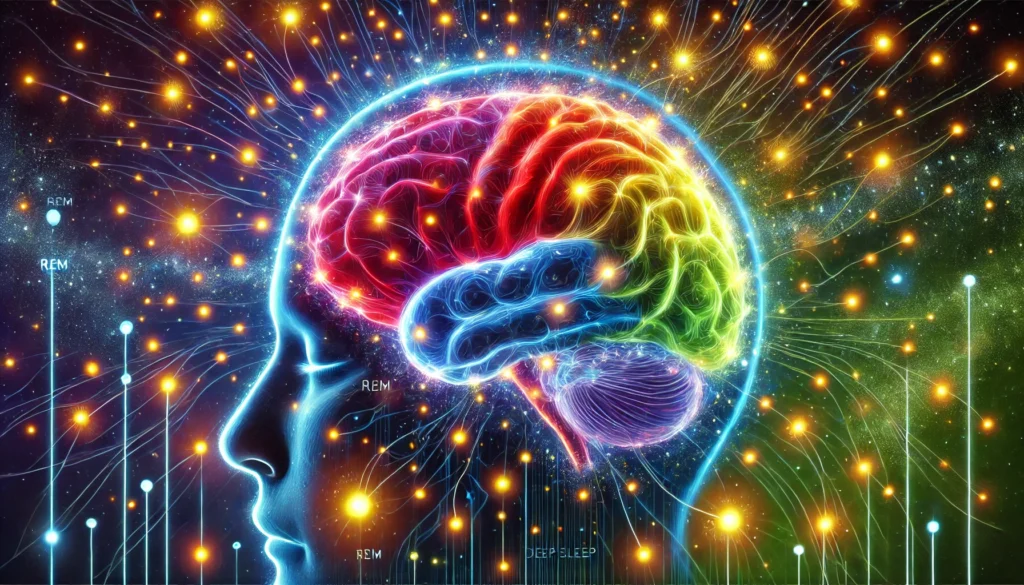Sleep is a fundamental human need. It’s as vital to our health and well-being as food, water, and air.
Yet, in our fast-paced, always-on society, sleep often takes a backseat. We sacrifice it for work, study, or entertainment, not realizing the toll it takes on our cognitive function.
This article delves into the science of sleep and brain function. It explores the minimum sleep requirements necessary for maintaining optimal cognitive performance.
We’ll examine the different stages of sleep and their role in memory consolidation, learning, and problem-solving. We’ll also discuss the impact of sleep deprivation on mental health and performance.
The importance of sleep quality, in addition to quantity, will be highlighted. We’ll also provide practical strategies for improving sleep hygiene and enhancing cognitive function.
For those interested in biohacking and nootropics, we’ll touch on their potential role in sleep optimization. Finally, we’ll look at the future of sleep research and its implications for cognitive health.
Whether you’re a health coach, a science journalist, a biohacker, or simply someone interested in improving your mental and physical health, this article is for you. Let’s embark on this journey to understand the minimum sleep requirements for cognitive function.
You May Also Like: The Connection Between Sleep and Cognition
Understanding Sleep and Its Phases
Sleep is a complex process composed of several distinct stages. Each stage plays a critical role in restoring our bodies and minds. Understanding these phases can illuminate why sleep is essential for cognitive function.
There are typically five stages of sleep, divided into two main categories: non-REM and REM sleep. Non-REM sleep encompasses the first four stages, while the fifth stage is REM sleep. Each stage serves unique functions essential for brain and body health.
Here’s a quick overview of sleep stages:
- Stage 1: Light sleep, transition period between wakefulness and sleep
- Stage 2: Heart rate slows, body temperature decreases, preparing for deep sleep
- Stage 3 & 4: Deep sleep stages, crucial for physical restoration and energy replenishment
- REM Sleep: Vivid dreams occur, brain activity increases, vital for memory consolidation
Stage 1 is essentially the gateway to the sleep cycle. As we transition from consciousness to sleep, our bodies begin to relax. Stage 2 marks the onset of true sleep, where our bodies start to prepare for deeper stages.
Stages 3 and 4, often referred to as slow-wave or deep sleep, are the most restorative. During this period, the body repairs muscle, builds tissue, and strengthens the immune system. It’s also the time when the brain detoxifies by clearing waste products, crucial for maintaining brain health.
REM sleep, the final stage of the cycle, is characterized by increased brain activity. This stage facilitates memory consolidation and supports learning and problem-solving. The vivid dreams we experience are thought to assist in emotional processing and stress regulation.
Each sleep cycle lasts about 90 to 110 minutes. A full night’s sleep comprises multiple cycles, highlighting the importance of uninterrupted sleep. Understanding these phases is vital for appreciating the minimum sleep requirements necessary for cognitive function.

The Science Behind Sleep and Brain Function
Sleep is crucial for our brain’s optimal operation. It helps maintain cognitive functions like memory, attention, and problem-solving. Without enough sleep, our brains struggle to perform tasks efficiently.
During sleep, our brains go through processes that reinforce learning and memory. REM sleep is particularly important here. This stage helps consolidate new information into long-term memory, playing a pivotal role in educational outcomes and knowledge retention.
Neuroplasticity is also affected by sleep. This is the brain’s ability to reorganize itself by forming new neural connections. Adequate sleep supports this adaptability, allowing the brain to adjust and learn new skills over time.
Furthermore, sleep is essential for detoxifying the brain. When we sleep, particularly during deep sleep stages, brain cells shrink slightly. This allows more space for the efficient removal of toxins like beta-amyloid, which is linked to Alzheimer’s disease.
Lack of sleep can disrupt many brain functions, impacting mood regulation and emotional resilience. This disruption often leads to increased stress levels and emotional instability. Essentially, sleep acts as a reset button, helping regulate our mental and emotional balance, crucial for overall cognitive health.
How Much Sleep Do We Really Need?
Determining the ideal sleep requirement varies by age and individual needs. The National Sleep Foundation provides a useful guideline. These recommendations help ensure optimal cognitive function and overall well-being.
Here’s a quick look at sleep durations:
- Newborns (0-3 months): 14-17 hours
- Infants (4-11 months): 12-15 hours
- Toddlers (1-2 years): 11-14 hours
- Preschoolers (3-5 years): 10-13 hours
- School-age children (6-13 years): 9-11 hours
- Teenagers (14-17 years): 8-10 hours
- Adults (18-64 years): 7-9 hours
- Older adults (65+ years): 7-8 hours
Adults, in general, need at least 7 hours per night to support brain health. Sleep below this threshold risks impairing mental functions such as memory and decision-making.
Teenagers, caught in a transitional stage, require more sleep to support their cognitive development. Unfortunately, many teenagers fall short, often due to lifestyle choices and educational demands.
Individual differences matter too. Some people need more sleep to feel refreshed, while others thrive on less. It’s important to listen to your body’s signals. If you wake up feeling fatigued or struggle with concentration, you might need to adjust your sleep schedule.
In summary, understanding personal sleep needs and adjusting accordingly can enhance mental stamina and brain function, supporting an active, healthy life.
The Consequences of Sleep Deprivation on Cognitive Performance
Sleep deprivation can have serious impacts on the brain and its functions. The lack of adequate sleep disrupts essential mental processes. Over time, these disruptions can lead to significant cognitive decline.
Firstly, sleep deprivation impairs attention and alertness. A tired brain struggles to focus, making daily tasks more challenging. This impairment affects productivity and increases the risk of mistakes.
Moreover, insufficient sleep has a detrimental effect on memory. Sleep plays a crucial role in memory consolidation, particularly REM sleep. Without enough sleep, both short-term and long-term memory suffer.
Problem-solving and decision-making abilities are also compromised by sleep loss. The brain’s capacity to assess situations and make informed decisions is dulled. This leads to poor judgment and increased impulsivity.
Mood regulation is another area where sleep deprivation takes a toll. A lack of sleep heightens emotional volatility, affecting relationships and mental health. Elevated stress levels and a reduced capacity to handle frustration are common outcomes.
The long-term effects of chronic sleep deprivation are even more concerning. Persistent lack of sleep is linked to neurodegenerative diseases, such as Alzheimer’s. It increases the risk of cognitive decline as the brain struggles to clear toxins.
Lastly, sleep disorders like insomnia and sleep apnea exacerbate these issues. Unmanaged, they contribute significantly to cognitive impairment and diminish quality of life. Therefore, addressing sleep deprivation should be a priority for anyone seeking enhanced cognitive function and overall well-being.

Sleep Quality vs. Sleep Quantity: What Matters More?
When discussing sleep and its effects on cognition, both quality and quantity matter significantly. However, individuals often wonder which of the two carries more weight. Answering this requires a nuanced understanding.
Sleep quantity refers to the total hours of sleep one gets each night. Most adults require 7-9 hours to function optimally. Yet, simply clocking in hours might not suffice if the sleep quality is poor.
Quality of sleep pertains to how restorative and uninterrupted those hours are. Deep sleep stages and REM are crucial for brain repair and memory consolidation. Interrupted or shallow sleep can leave a person feeling groggy despite ample sleep duration.
Research underscores the importance of both aspects. A study showed that poor sleep quality often correlates with impaired cognitive functions, even if the quantity seemed adequate. This highlights that fragmented or non-restorative sleep might be more detrimental than slightly shorter sleep durations.
On the other hand, chronic sleep deficit, regardless of quality, accrues a sleep debt that hampers mental sharpness over time. Thus, achieving a balance is essential. Ensuring that both the duration and the quality of sleep align with one’s personal needs is pivotal for maintaining optimal cognitive health.
In conclusion, sleep quality and quantity are intertwined pillars of cognitive function. Prioritizing one over the other can lead to incomplete recovery, impacting mental performance. Therefore, striving for both adequate and restful sleep is key to robust brain health.
Strategies for Improving Sleep for Better Brain Health
Enhancing sleep quality is integral for cognitive well-being. Simple lifestyle adjustments can substantially improve both sleep quality and duration. These strategies not only promote better sleep but also bolster brain health.
First, establish a consistent sleep schedule. Going to bed and waking up at the same time daily can help regulate your body’s internal clock. This consistency enhances sleep patterns and aids in achieving optimal sleep phases.
Next, prioritize your sleep environment. Create a bedroom that fosters relaxation and comfort. Consider factors like temperature, noise, and light. A cool, dark, and quiet room can make a significant difference.
Implementing a wind-down routine before bed is also beneficial. This might include activities like reading, meditating, or taking a warm bath. Such habits signal to your brain that it’s time to relax, improving your chances of falling asleep more easily.
Here are a few actionable strategies to consider:
- Limit exposure to screens at least an hour before bed.
- Avoid caffeine and heavy meals in the hours leading up to sleep.
- Engage in regular physical activity, but not too close to bedtime.
- Consider mindfulness or relaxation techniques to reduce stress.
Finally, consider the potential role of sleep tracking technology. Monitoring your sleep patterns can provide insightful data. This data helps in identifying disruptions and allows for informed changes to your sleep habits.
Incorporating these strategies can significantly impact your overall sleep quality and cognitive function. Improved sleep leads to enhanced focus, memory, and problem-solving abilities, contributing to better brain health over time.
The Role of Nootropics and Biohacking in Sleep Optimization
Nootropics, often labeled as “smart drugs,” are substances that could enhance brain performance. Some nootropics show promise in optimizing sleep. Compounds like melatonin and L-theanine may promote relaxation and better sleep quality.
Biohacking involves strategic interventions to improve bodily functions. For sleep, this might include adjusting light exposure or using gadgets that support sleep efficiency. Blue light blockers and sleep apps can be part of a biohacker’s toolkit.
When exploring nootropics or biohacking for sleep, professional guidance is essential. It’s vital to understand the potential benefits and risks. While these tools might support sleep optimization, they should be approached cautiously. Balancing natural sleep strategies with nootropics and biohacking may offer the best outcomes for cognitive function and well-being.
The Future of Sleep Research and Cognitive Health
The future of sleep research holds exciting potential for unlocking cognitive health benefits. Scientists are delving into how sleep influences brain function and overall health. This burgeoning field may redefine how we approach cognitive longevity.
One focus area is personalized sleep medicine. This involves tailoring sleep recommendations based on individual genetics and lifestyle. Utilizing wearable technology, sleep patterns can be monitored in detail, offering insights into personal sleep needs.
Research into the role of sleep in preventing neurodegenerative diseases is gaining traction. Understanding how sleep affects conditions like Alzheimer’s could lead to new preventative strategies. Proper sleep may emerge as a key factor in delaying cognitive decline.
Additionally, advances in technology are set to revolutionize sleep studies. Innovations such as AI and machine learning are being integrated into sleep research. These tools can analyze vast amounts of sleep data swiftly, enhancing our understanding of sleep’s intricate role in brain health. The synergy between technology and research promises a future where sleep is prioritized as an essential component of cognitive vitality and mental wellness.

Conclusion: Embracing Sleep for Cognitive Longevity
In conclusion, sleep serves as a cornerstone for cognitive health and longevity. Prioritizing restful sleep supports mental clarity, emotional balance, and brain resilience. As we learn more about its vital role, adopting healthy sleep habits becomes increasingly important.
Investing in sleep quality and duration can yield significant cognitive benefits. Simple lifestyle changes like maintaining a regular sleep schedule and creating a soothing sleep environment can have profound effects. Embracing these practices ensures not only improved brain function today but also sustained mental sharpness and well-being in the years to come.
Further Reading:
Mayo Clinic: How many hours of sleep are enough for good health?
Sleep Foundation: How Lack of Sleep Impacts Cognitive Performance and Focus
National Library of Medicine: The Neuroprotective Aspects of Sleep
Important Note: The information contained in this article is for general informational purposes only, and should not be construed as health or medical advice, nor is it intended to diagnose, prevent, treat, or cure any disease or health condition. Before embarking on any diet, fitness regimen, or program of nutritional supplementation, it is advisable to consult your healthcare professional in order to determine its safety and probable efficacy in terms of your individual state of health.
Regarding Nutritional Supplements Or Other Non-Prescription Health Products: If any nutritional supplements or other non-prescription health products are mentioned in the foregoing article, any claims or statements made about them have not been evaluated by the U.S. Food and Drug Administration, and such nutritional supplements or other health products are not intended to diagnose, treat, cure, or prevent any disease.


